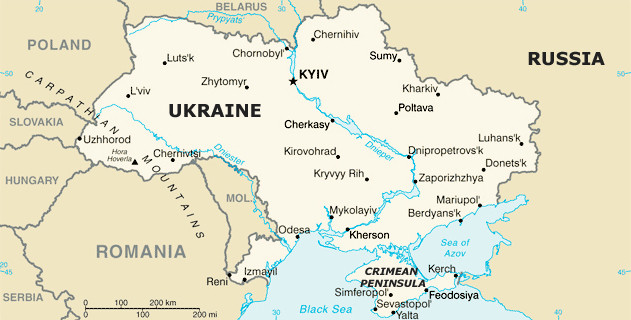Ukraine crisis: Is there a light at the end of the tunnel?

De-escalation measures have begun in eastern Ukraine as the sides start to withdraw light weaponry from the frontlines – a move expected to be accompanied by political steps in accordance with the Minsk peace agreements signed in February. But are the parties to the conflict ready for this?
(Russia Beyond the Headlines – rbth.ru – Alexey Timofeychev, RBTH – October 6, 2015)
Hopes are growing that the ceasefire between government forces and pro-Russian rebels in the Donbass region of eastern Ukraine may be moving toward a lasting peace, as both sides begin withdrawing weaponry from the line of contact.
The self-proclaimed Lugansk People’s Republic (LNR), one of two breakaway entities in the Donbass, confirmed on Oct. 5 the withdrawal by the Ukrainian military of weapons with a caliber of less than 100 mm from the line of contact, which began the same day.
The LNR itself began the removal of light weapons as early as Oct. 3. These measures were agreed upon at a meeting between the leaders of Russia, Ukraine Germany, and France in Paris on Oct. 2, which mainly confirmed the lack of options other than the implementation of the Minsk peace agreements signed back in February.
The Paris arrangements, according to the meeting’s participants, require concessions from both parties to the conflict. This primarily concerns the issue of the upcoming local elections, which the Donbass is still planning to hold separately from Ukrainian general elections (which will take place on Oct. 25).
In Paris, the self-proclaimed DNR (Donetsk People’s Republic) and LNR were advised to review these plans and to organize elections in accordance with Ukrainian legislation.
In turn, Kiev was recommended to adopt a special law on elections in the Donbass in consultation with the breakaway regions’ leadership, pass a constitutional amendment allowing for a special status for the Donbass and grant amnesty to all combatants.
A question of stability
However, are the parties are willing to implement these arrangements, which in fact have only confirmed, once again, the importance of the Minsk agreements?
Russian observers say these concerns mainly relate to the Ukrainian authorities, since, according to analysts, it is easier for the DNR and LNR to organize the elections in a timely and effective manner.
“It is easier for the Donbass to fulfill the political part of the agreements, including the rescheduling of the elections, than for Kiev. <…> For Kiev, it is a question of stability of the political regime, the internal stability of the country,” Maxim Bratevsky from the Center for European Studies at Moscow’s Higher School of Economics told RBTH.
At the same time, as Yevgeny Minchenko, head of the International Institute of Political Expertise, points out, as far as elections are concerned, a compromise is fully possible. They can be held in the Donbass in single-mandate constituencies, rather than with the participation of Ukrainian and regional political parties.
Is the West refusing to support Poroshenko?
Russian observers say that Kiev, represented by Ukrainian President Petro Poroshenko, does not have much room for maneuver in relation to the situation in the Donbass.
“There is an assumption that Poroshenko failed to receive 100-percent support from [his] Western partners [at the meeting in Paris]. Apparently, it was pointed out to him that breaking the Minsk agreements into parts <…> and implementing some agreements while not implementing the others, without engaging in the political process, will not work,” said Bratevsky.
According to Minchenko, “from unconditional support for Poroshenko, they [Europeans] have moved toward a rather critical perception and to the [understanding] that they should put pressure on him so that he fulfill his promises.”
The expert attributes this “major change” in Europe’s position to “objective reasons”: “The man [Poroshenko] always promises, but does not do anything.”
Poroshenko and the political crisis in Kiev
Ukrainian analyst Andriy Yermolayev, director of the New Ukraine Institute for Strategic Studies, agrees that this state of affairs is now coming to an end.
He stresses that Europe is forcing Poroshenko to act “even at the cost of significant perturbations in Ukraine itself.” According to him, the implementation of the Paris plan could lead to a “more or less sustainable ceasefire and a decrease in the physical presence of Russia in the Donbass.”
However, this does not remove the process of the further “autonomization” of the Donbass from the agenda.
“Not all members of the current ruling coalition are interested in the peace process, even if difficult and painful – there is a “party of war” and there are supporters of a “smaller Ukraine” (Ukraine without the Donbass),” said Yermolayev.
“The president himself – who, unfortunately, does not show consistency or have a clear platform on the issue of the Donbass – is in a difficult position.”
But despite these problems reaching a peaceful settlement, Yermolayev believes – just like his Russian counterparts – that despite all this, a resumption of hostilities in eastern Ukraine is still not to be expected.
Article also appeared at rbth.com/international/2015/10/06/ukraine_crisis_is_there_a_light_at_the_end_of_the_tunnel_49861.html
